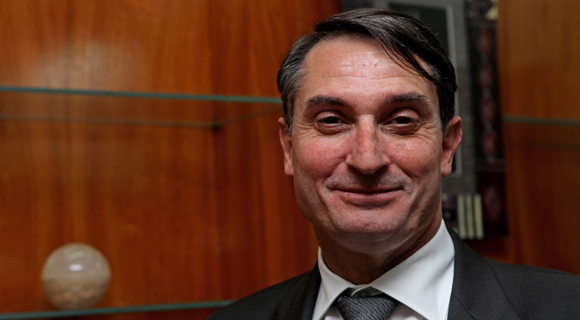Alios Finance
Thierry Papillion, General Manager of Alios Finance
Alios Finance is complimentary to the banks and provides services to SMBs, which often say that banks are their nightmare. Alios Finance is close to its clients and works only in half of the banking field. Alios Finance is considered as a precursor to leasing because it started leasing in 1976.
Interview with Thierry Papillion, General Manager of Alios Finance

What were the direct and indirect effects of the crisis on the banking, finance, and credit sectors?
Before answering this question directly, I want to reposition our institution. In the banking landscape, we consider ourselves as a bank apart from others; we are complementary, because we work in one half of the field. We only do the credit part; we are not in savings. We are considered as a precursor to leasing, because we started doing it back in 1976. Alios Finance continued on this path of rather special commercial relations and is extremely close to its clients. We are complimentary to the banks and provide services to SMEs, which often say that banks are their nightmare, because the banks lack speed and flexibility.
From there I arrive to your question. As SME have less of an ability to absorb shocks than companies do with global operations, the impact of the crisis was felt mainly in the SME sector, and it is precisely this type of industry that needs more assistance. It is this proximity with which we have always worked with our clients that has allowed us to assist them pre-crisis, during crisis, and post-crisis.
As we have always worked hand in hand with our clients. Our relationship is symbiotic. Even in times when one might think that the client would say, “we’ll see to payment later”, we in fact do manage to minimize the non-performing loans. During the post-electoral crisis, Alios Finance half-stopped its operations as the business virtually came to a standstill. All this cannot happen without pain. Therefore, we gradually absorbed the shocks and by the end of December, we estimated that the worst was behind us. For those clients who suffered the most, we must expect to assist them even throughout 2012 and perhaps even 2013 as they require more time to absorb this shock.

All this is possible because we have a long-standing knowledge of our clients and a unique relationship-based approach. But above all, when you go see a client, you must first ask yourself: “If I had to take this client’s place tomorrow, how would I do his job?” First, learn his trade; you will know how he works, and you can then assist him and respond very quickly to his needs. It is true that this closeness has allowed us to react very quickly to all the harsh realities in recent months and recent years.
I think that 2010 would have been a very good year except for the last two months. 2011 is and was difficult, but 2012 should be a year with great prospects.
Your clients are SMEs. Do you also support microcredit? Is this an activity that you want to develop in the future? What are the services you offer?
Historically, Alios Finance has always been into transport. But it is clear that competition is heating up, because banks, little by little, have moved closer to our business model and our traditional market: the automotive market. Therefore, our traditional business model became obsolete with time. To change our strategic orientation, we differentiated our products and expanded our areas of activity to all material, including industrial chains, office automation, etc.
In terms of clients, Alios Finance has several client categories. First, Alios Finance usually works with and offers financial leasing to large international companies. In this case, our services include outsourcing parks, office parks, rolling stock parks, etc. For example, a client rents a vehicle park, and three years later, he ends the lease and starts with a new park. The process is fully integrated, including insurance, maintenance, etc. These are set-ups that are made in partnership with dealers, insurers, etc. That is what I call companies with global operations.
As we have always worked hand in hand with our clients. What is quite interesting is the symbiotic nature of our relationship. Even in times when one might think that the client could say, “We’ll see to payment later,” we in fact do manage to get paid.
With these large companies, we also work along with their subcontractors, usually SMEs, because for these large companies to conduct large-scale business, they need different subcontractors such as transporters, planters, etc. From there, we can finance all the material and needs of these subcontractors. It signifies a certain amount of business and provides security to the operations. We work with large companies’ subcontractors in all types of industries.
We also work for the employees of large companies. Two years ago, we created a center for private individuals. Just as we have a center for the business clientele, our personalized, easy-to-reach team of professionals serve and offer the same services to private individuals. In our center, we try to recreate a homely feeling while taking care of their problems.
With regards to employees, the employer deducts from the wage the share – the montly instalment – due to us. With these large companies, we in fact have partnerships to finance their employees.
The company is there as a management tool, but the one benefitting is still the employee. So the one we must follow, reassure and assist is also the employee. The employee does not necessarily have a bank account, so regardless of that, we can grant him a credit at this moment.
With regard to microfinance, it is in another domain. We are not active in this field and do not intend to be. Banks do their job, we do ours, and microfinance does its work.
Can you give us some figures on the number of customer service staff?
Here, for the consumer finance pole, we have six customer service consultants. And for professional pole, we have five professional advisors per industry. This excludes staff in finance, recoveries, credit, audit and IT.
Why would your client choose you rather than going to a bank?
I would say two main things. Firstly, we are complementary, that is to say the big companies will have significant investment plans, beginning-of-year budgets, and they will go to the banks to draw up their investment plans.
Then, during the year, problems occur and they need additional, off-budget investment. We know that banks do not have the same approach. We are hand-crafters; as I sometimes say jokingly, we are blue jeans Yves Saint Laurent. Yves Saint Laurent because we custom-tailor, and blue jeans because we want conviviality and familiarity to assist our client. The knowledge of the client is a key to our success.
The third thing is flexibility. Any financial request must be processed within 48 to 72 hours. Our reaction must be very fast. There are no undecided files on my desk when I leave the office at night.
When a credit exceeds a certain amount, it goes to what we call the group committee. There are four members in this committee, of which I am one. Our imperative is to respond within 48 hours; it is mandatory. We generally respond within 24 hours.
How do you manage risk?
Alios Finance has a 50-year history. Actually, our results are quite interesting in terms of risk. We live “with our customers”. We know them very well; we know how they work. As a result, in March, when repayments were the major issues in the field, our revenue stream continued with only minor interruptions.
We have a true closeness with our clients, and our speed of response is our strength. The services are more expensive than those of banks because the funding sources are different, but we also offer a service that is different in many ways: closeness, flexibility, etc.
Do you work with banks?
We work with banks. We sometimes find ourselves in competition with them, it is true, but they are first and foremost our partners, as we get financed mostly through banks. It is the banks who provide Alios Finance the necessary funds to provide the leases and loans, as we are not a deposit taking institution.
We differentiate from our banks, as we always try to respond to the client’s different problems. Alios finance always strives to develop services to address the needs of the clients.
Another point with respect to banks is that we have greatly expanded leasing. At first, we were in loans; then we moved very quickly to leasing, because leasing is opportune for companies on the condition that the environment is suitable. SMEs want flexibility because they do not necessarily have many means, they do not have many guarantees to give, and in general, they look for a rapid solution to their financing need. Banks, in general, will demand additional guarantees that some start-ups, and companies that do not yet have the financial strength for this, cannot necessarily give. So through leasing, one has flexibility.
How do you see the future of your company internationally? How do you see your society ideally in five years?
To get a perspective on the long term, we should perhaps look back five years. Five years ago, we decided to expand into the sub-region, starting from Côte d’Ivoire and having branches in Mali, Burkina Faso and Senegal. This expansion is not yet complete, since Alios Finance is not present in Benin, Togo and Niger. The geographical coverage allows us to grow with our clients and offer new innovative products across the sub-region.
Second, our product strategy is based on 2 pillars. First, in order to make leasing a useful tool for SMEs, we need to focus on changing the leasing laws and environment. On the individual front, we would like to become a major player in consumer credit. I think that flexibility is key, and to really approach consumer credit, we must work toward flexibility and speed, so that the employee can very quickly resolve personal problems with our help.
Between the geographical expansion, the elaboration of leasing, and developing our services to individuals, I think we already have some important objectives to achieve. Our goal is to be a leading financial institution in sub-Saharan Africa, as well as a leader in leasing and consumer credit. At the group level – which is also present in Central Africa, Cameroon and Gabon, and which is forming an important development strategy toward English-speaking Africa with openings in Zambia, Tanzania and in Kenya this year – the strategy is the same: leasing and consumer credit. Our group wants to expand to the English-speaking and French-speaking parts to be a leading financial institution in leasing and consumer credit in sub-Saharan Africa.